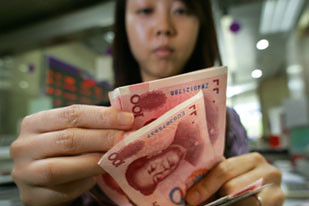
Chinese citizen counting money amid the global economic crisis. The Chinese Premier expressed concern over the $1 trillion in US debt held by the Asian nation., a photo by Pan-African News Wire File Photos on Flickr.
Influence of the yuan in Africa set to grow
Apr 21, 2013 | Thekiso Anthony Lefifi
South African Business Day
The yuan is already part of African central bank reserves in Angola, Nigeria and Tanzania and is likely to be included in South Africa's reserves soon
INTERNATIONAL currencies wars are silently brewing on the African continent and the prevailing currencies of trade — the dollar and the rand — are likely to be the casualties. The winner? The Chinese yuan renminbi.
The yuan is already part of African central bank reserves in Angola, Nigeria and Tanzania and is likely to be included soon in South Africa’s reserves, following news during last month’s Brics summit that the Reserve Bank could invest up to $1.5bn in dim sum bonds. This is fairly substantial — equivalent to about 3% of South Africa’s foreign currency reserves.
“The problem is that 85% of the average turnover in the global foreign exchange market is (with dollars). The share is odd, given that China is the world’s largest importer and exporter,” said Standard Bank’s economist in Beijing Jeremy Stevens.
In sub-Saharan Africa, the rand has also played a large role until now.
International banking group Standard Chartered says a number of other African central banks are also now figuring out a Chinese currency strategy.
Last year the central banks of Nigeria and Tanzania invested in 500m yuan worth of dim sum bonds from the China Development Bank, as part of a 3.5bn yuan three-year issue. Angola’s central bank said in 2011 that it was looking at including the yuan in its reserves
In the next five years, according to China’s central bank deputy governor Li Dongrong, African central banks will hold more than 20% of their foreign reserve portfolios in yuan. During the Brics summit, Standard Bank joint-CEO Sim Tshabalala diplomatically said that he would not be surprised by an increase in yuan renminbi trade settlements on the continent.
Standard Chartered’s regional head of transaction banking for Africa Peter Sun expects the influence of the yuan in Africa to grow “considerably” as the continent’s economies expand. This is not a sure thing, however. Nomura’s director and emerging market economist Peter Attard Montalto says he does not see the Chinese currency replacing the dollar any time soon, even though it will become “more important”.
Last year, bank transfers between China and Africa hit $5.7bn — up from $750m in 2011. This is obviously only one element of trade between the continent and China, but it is an increasingly large one. Almost 90% of total transfers took place between China and South Africa.
Overall, Standard Chartered expects China-Africa trade to reach $385bn by 2015 and 10% of this could be settled in yuan renminbi.
Africa is not unique, though, as China extends its tentacles into all the global markets.
Earlier this month the Australian dollar became only the third currency to trade directly with the Chinese currency, alongside the US dollar and the Japanese yen. China also recently announced intentions to set up a currency swap line with France in order to make Paris a major offshore yuan trading hub in Europe, competing with London.
This has not been without controversy, with some countries slamming the central bank, the People’s Bank of China, for keeping the value of the yuan artificially low so as to help Chinese exports.
South Africa has been a major beneficiary of this plan, as it has imported huge amounts of cheap clothing from China. Some pundits say the yuan has been undervalued by as much as 25% — giving Chinese exporters an unfair advantage.
Mr Stevens said the yuan is still likely to continue its steady appreciation against the dollar.
“Sometimes, the forces pushing the Chinese currency ahead against the dollar are the same ones — for instance the return of risk appetite — that will push the African currencies stronger, therefore keeping the relative values of the Chinese and African currencies unchanged,” he said.
* This article was first published in Sunday Times: Business Times
No comments:
Post a Comment